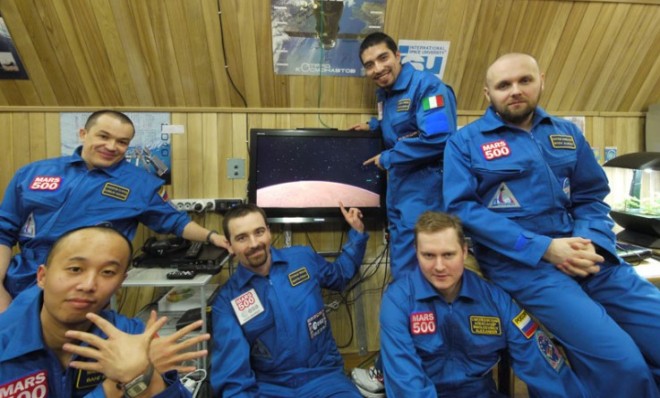The perils of sleeping in space
What's it like to sleep in a windowless spaceship with five other people breathing down your neck?

A free daily email with the biggest news stories of the day – and the best features from TheWeek.com
You are now subscribed
Your newsletter sign-up was successful
Sleeping in space is a tricky business. For starters, there isn't any gravity keeping you tucked into a warm, cozy bed. Plus, you're nearly shoulder-to-shoulder with a bunch of equally uncomfortable astronauts.
And researchers have discovered new challenges to snoozing in space, after concluding a study of six men who agreed to spend 520 days locked inside a windowless, pressurized environment in Moscow meant to simulate life on a spaceship heading to Mars and back.
For the study, the astronauts did not float around in a zero-gravity environment. Using a device called an actigraph, scientists at the University of Pennsylvania and Baylor College of Medicine in Houston monitored the crew members' movements and the amount of light they were exposed to at any given time. The subjects also took computerized reaction-time and vigilance tests twice a week, and were regularly asked questions about their workloads, how tired they were, and the quality of their sleep. The results weren't pretty.
The Week
Escape your echo chamber. Get the facts behind the news, plus analysis from multiple perspectives.

Sign up for The Week's Free Newsletters
From our morning news briefing to a weekly Good News Newsletter, get the best of The Week delivered directly to your inbox.
From our morning news briefing to a weekly Good News Newsletter, get the best of The Week delivered directly to your inbox.
On average, sleep time for each of the subjects increased by more than 8 percent, which works out to 35 minutes more sleep a day — not necessarily a bad thing. But the crew members were much more lethargic when they were awake, and by the end of the study had reduced their period of active waking behavior by a full 70 minutes. Four of the members reportedly suffered from psychological issues.
"The reason this matters is because, in the microgravity found in space, which we didn't simulate, if you're not active, you can suffer loss of bone and muscle, and decondition your cardiovascular muscle very severely, making it difficult to complete missions," study author David Dinges told SPACE.com. "This shows we've got to find ways to keep crew physiologically active."
Without any sunlight telling him when to sleep, one crew member started sleeping at odd times on a 25-hour day schedule, which threw off his circadian rhythms. "This could potentially be dangerous during mission-critical tests," says researcher Dr. Mathia Basner.
What makes the whole study particularly scary is that the brutal living conditions can provoke startling behavior changes. On the extreme end, explorers trekking through the Antarctic wilderness, where the day's cycles are similarly sunless, have reportedly suffered horrifying descents into madness. Other side effects can also be damaging, says The Los Angeles Times:
A free daily email with the biggest news stories of the day – and the best features from TheWeek.com
Though there are a few legendary stories of madness and violence — a cook who turned on others with a hammer, a scientist who axed a colleague over a chess dispute — [researchers say] most problems are lower-grade feelings of depression, anger, and irritability, along with difficulty of sleep and concentration that may exhibit itself in what is often referred to as the zoned-out "Antarctic stare."
The next step for researchers is to figure out how to keep astronauts physically active while maintaining healthy sleep cycles. One idea is to have the spaceship emit blue wavelengths of light that would trick the body into thinking it's still on Earth.
-
 Why is the Trump administration talking about ‘Western civilization’?
Why is the Trump administration talking about ‘Western civilization’?Talking Points Rubio says Europe, US bonded by religion and ancestry
-
 Quentin Deranque: a student’s death energizes the French far right
Quentin Deranque: a student’s death energizes the French far rightIN THE SPOTLIGHT Reactions to the violent killing of an ultraconservative activist offer a glimpse at the culture wars roiling France ahead of next year’s elections
-
 Secured vs. unsecured loans: how do they differ and which is better?
Secured vs. unsecured loans: how do they differ and which is better?the explainer They are distinguished by the level of risk and the inclusion of collateral